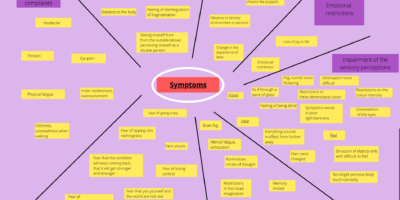Depersonalization and derealization belong to the category of dissociative phenomena. Dissociation can be understood as an umbrella term for various experiences involving changes or loss of self, space, and time. It can range from mild (slight feelings of unreality) to severe (dissociative amnesia, complete „blackout“).
Fragmentation
People who frequently experience feelings of alienation or unreality struggle to perceive themselves as a whole being in a specific time and space. They often feel fragmented internally and have difficulty grasping the consistency of time and space.
For individuals with depersonalization or derealization, an event that happened just a few minutes ago may feel like a distant memory from the past.
People with depersonalization or derealization may also have trouble orienting themselves or objects within a space, or recognizing a room from the correct perspective, as they often lose their sense of three-dimensionality.
Some affected individuals report seeing themselves from above, feeling as if a robot is acting through them, or even sensing what a stone on the ground „feels“ like – as if they themselves are being touched – due to a breakdown in the subject-object distinction.
Dissociation and Trauma
Dissociative phenomena can also occur in response to trauma. This is especially common during traumatic events themselves. People who have experienced severe incidents such as accidents, war, or sexual assault frequently report feelings of unreality or alienation during those moments.
For most individuals, these phenomena disappear once the situation is over or after some time has passed.
However, dissociative phenomena can also emerge as a consequence of trauma, such as during typical flashbacks or in response to triggering stimuli. Many affected individuals report experiencing depersonalization and derealization in these instances as well.
For most, these phenomena eventually fade with time. However, in some cases, feelings of unreality or alienation may repeatedly resurface if the underlying trauma has not been adequately processed.
Depersonalization or Derealization Do Not Always Indicate Trauma!
People who have endured severe trauma often experience dissociative phenomena.
However, this does not mean that everyone who experiences feelings of alienation or unreality has gone through major trauma.
On the contrary, most individuals who suffer from persistent or recurring depersonalization or derealization do not have a history of trauma.
Therefore, searching for „hidden“ traumas or trying to force their discovery – something that unfortunately happens in many therapies – Is often more harmful than beneficial to the affected individual.
Feelings of Alienation and Unreality and Classic Coping Techniques
Many individuals with depersonalization or derealization are advised to use classic coping techniques to manage their experiences. Classic techniques such as rubber bands, stress balls, or tapping…
These methods are typically only effective for depersonalization or derealization that occurs in short episodes and can be alleviated using such techniques.
However, persistent feelings of unreality or alienation cannot be resolved through classic coping techniques alone.
In these cases, psychotherapy or consistently applied self-help strategies are necessary.

Schreibe eine Antwort